Partners in Recovery
Levels of Care that meet client recovery needsAnyone who comes through our doors and requests assistance gets connected to available resources.
For those who have a low income and are uninsured, we designed our Partners in Recovery program that offers different levels of care based on client readiness and personal goals.
Personal Addiction Recovery Team (PART)
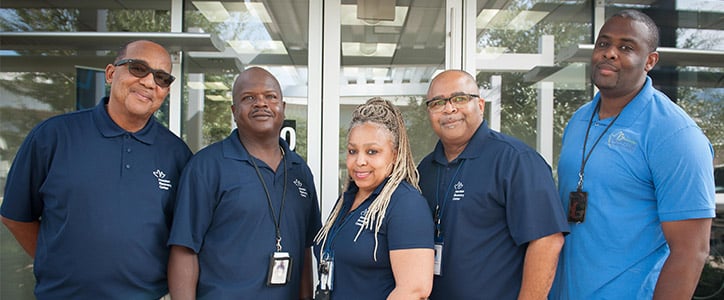
Our flagship 18 month recovery program for underserved individuals
The Personal Addiction Recovery Team (PART) pairs clients with a licensed chemical dependency counselor and a peer recovery support specialist for six months of intensive case management and 18 months of peer recovery support. They assess the client’s substance use and mental health needs as well as other health and life needs and connect them to appropriate community resources, providing transportation and warm handoffs to substance use treatment and other services. We help clients achieve recovery and close the revolving door of arrest, medical emergency, and substance use.
Peer Recovery Support (PRS)
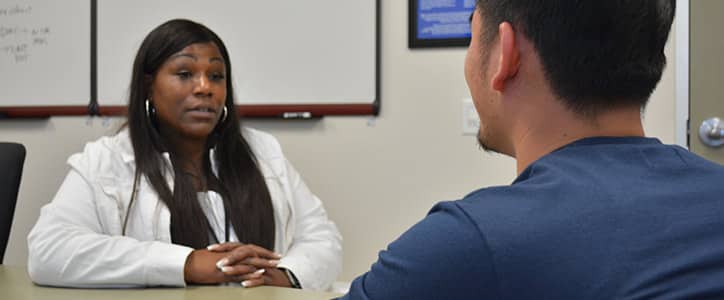
Peer-to-Peer conversations that build trust and foster growth
Some clients prefer to begin with a more informal program before they are ready to commit to addiction treatment. Some simply need to talk things over with someone who’s walked in their shoes. State certified peer recovery support specialists coach clients to define their personal goals, develop a plan to achieve them, and assess progress Different than 12-step programs, peer coaching looks 360 degrees at the client’s life so he|she can define the most important next steps of their recovery and continue re-building their social and community life. Every recovery path is unique, and they receive six months or more of peer support.
Pre-Recovery Engagement Plan (PREP)
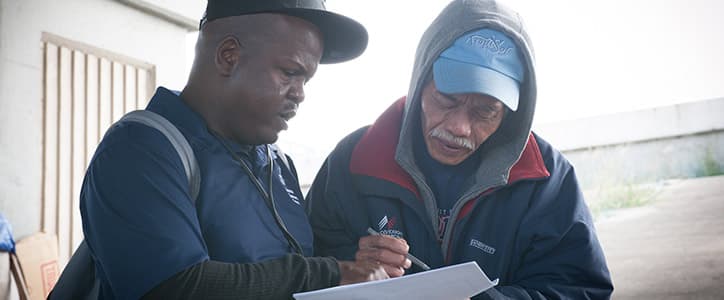
Opening the door to recovery from the street
We specialize in building trusted relationships with our clients. This is where our Pre-Recovery Engagement Plan comes in. A relatively small group of clients have come to the sobering center 10 times or more, contributing to a disproportionately large number of our total visits. Often, these clients have given up completely on the idea of recovery. Many of the same clients also have frequent emergency service use—including ambulances, emergency departments, and hospitals—as well as criminal justice involvement. We designed the Pre-Recovery Engagement Plan to give these clients the opportunity to connect with us and address their most important health or life challenge without having to commit to addiction treatment. This is a harm reduction approach with the goal of improving client quality of life.
Peer recovery support specialists help clients gain stability. Eventually some reach a place where they are motivated enough to take the first step on their pathway of recovery. We are on the streets meeting with them in their environment conducting wellness checks and shooting the breeze. It can take six months to a year to establish a trusted relationship. When the time is right, they work with us.
Jail In-Reach
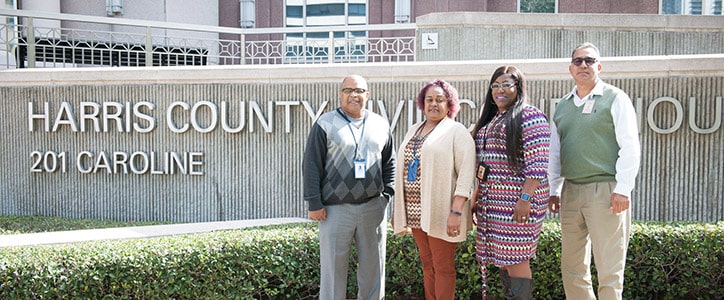
Bridging justice involved with recovery solutions
Reaching Houstonians most vulnerable to substance use disorders means acknowledging that substance use often lies at the root of public safety issues.
Our Jail In-Reach program works with the Harris County Sheriff’s Office to interview inmates pre-screened and interested in addiction services. These inmates are introduced to our staff, who establish a relationship with them and prepare them to enter a Partners in Recovery program so services can begin at the moment of reentry.
Responsive Interventions for Change (RIC) Docket
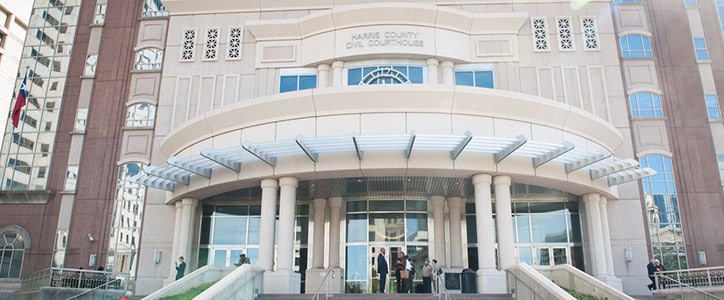
Bridging justice involved with recovery solutions
It was only a natural progression that we started placing recovery support specialists in the Responsive Interventions for Change (RIC) Docket after already working with clients in STAR Drug Court and Felony Mental Health Court. RIC Docket provides an opportunity for non-violent offenders, who have a substance use disorder, to enter recovery conversations with our staff and receive substance use treatment instead of cycling in and out of jail.
Those that say yes to ongoing peer support are assigned a coach that sticks with them as they address court stipulations, treatment services, and personal goal setting. These specialists, who have come through the criminal justice system, can have a recovery conversation that judges, lawyers, and probation officers cannot have. If they stay on track with their recovery for one year, the district attorney drops the charges.
This collaborative partnership between the criminal justice system and community partners has proved successful. One year after RIC Docket began, the number of jail days dropped 100,000 for low-level felony drug and prostitution cases. And the number of cases going to jail versus community supervision has reversed: 79% conviction and jail before RIC Docket is now 15% receive a conviction and jail sentence and 85% diverted to community supervision.
Adult Probation
Bridging justice involved with recovery solutions
Substance use is challenging to overcome, and probationers using opioids, heroin and other illicit substances often face major challenges staying in contact with their probation officers. To improve connections and outcomes, Houston Recovery Center and Harris County Adult Probation are working together to provide much-needed peer support for these probationers. Two recovery support specialists now work inside the probation department, using their lived experience in opioid use recovery to begin healthy conversations, develop life-changing relationships, and increase self-efficacy. Clients are offered coaching through Partners in Recovery program so they can successfully complete their probation requirements while addressing issues surrounding substance use and recovery.
Houston Emergency Opioid Engagement System (HEROES)
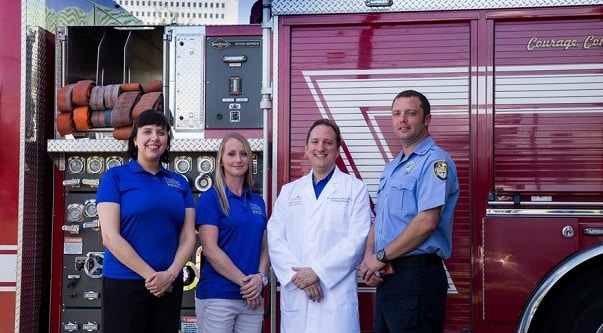
Opioid use has become a national public health crisis. Locally, Houston Recovery Center partnered with UTHealth Science Center at Houston, Memorial Hermann Hospital, and the Houston Fire Department to create a system of care for individuals in hospital emergency departments due to opioid overdoses. The Houston Emergency Opioid Engagement System (HEROES) includes a Houston Recovery Center recovery support specialist with lived experience in opioid use recovery who builds relationships with patients and offers coaching through Partners in Recovery program. HEROES launched in 2018 and has helped more than 225 Houstonians to date.
Texas Targeted Opioid Response
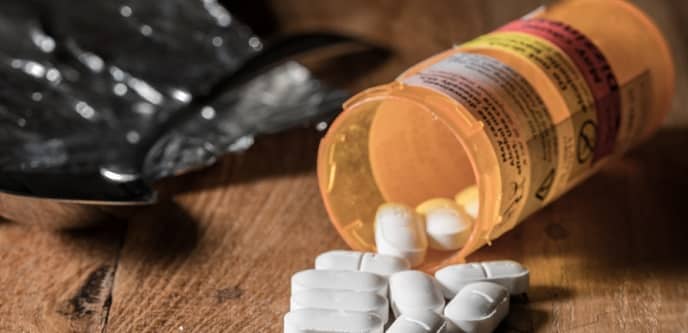
STATE’S RESPONSE TO OPIOID DEATHS
Because opioid deaths continue to spiral nationally, the state of Texas selected Houston Recovery Center as an intervention site for individuals using opioids. Texas Targeted Opioid Response (TTOR) initiative trains clients in and provides access to NARCAN® to prevent overdose death as well as offers medication-assisted treatment and 18 months of free recovery assistance. Our door is open 24/7/365 days a year serving our community. Texas Health and Human Services Commission funds this new program as part of the TTOR initiative.
Project Reach
HELPING HOUSTON’S MOST VULNERABLE POPULATION
Houston Recovery Center stepped in to work with Houston’s most vulnerable population in HIV, Hepatitis C, and substance use disorders. Our agency provides free trauma counseling, substance use recovery programs and health screenings/treatment for HIV/AIDS and Hep C. Project Reach primarily targets young minority men who are gay, bisexual, transgender, and heterosexual who may be at risk or living with HIV/AIDS or Hep C, have substance use disorder, opioid use, history of trauma, or IV injection use although health screenings are available to all clients.
FRONTLINES (First Responder Opioid Overdose Naloxone Training and Linkage Into Needed Evidence-based Services)
PEER RECOVERY and EMERGENCY DEPARTMENT
A new community collaboration is working systemically to change lives. Houston Recovery Center, Houston Fire Department, Houston Health Department, and Baylor College of Medicine have come together on FRONTLINES (First Responder Opioid Overdose Naloxone Training and Linkage Into Needed Evidence-based Services). This program teaches first responders how to recognize opioid and opiate misuse and overdoses as well as administer naloxone, a medication designed to quickly reverse an opioid overdose. Peer recovery specialists meet EMS at the emergency department to visit overdosed individuals and start building a relationship and engage them in medicated-assisted treatment and recovery options. A $2-million grant from Substance Abuse and Mental Health Services Administration (SAMHSA) supports this program for four years.
8 minutes
Average time for officers to admit a client into the Sobering Center